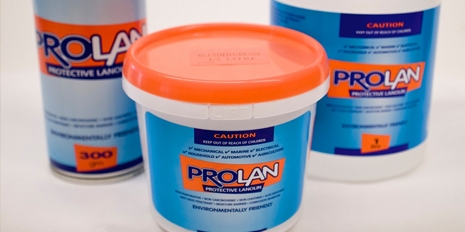
This is an article about Prolan posted on the Ministry of Business Innovation and Employment website (MBIE). We’re pleased to be part of another successful R&D project funded through MBIE Science + Innovation Group, and congratulations to Prolan on their continued growth and success.
A small Tauranga-based company is gaining a competitive advantage in the Scandinavian market with its sheep-derived lanolin products.
Lanolin – a natural form of wax found in sheeps’ wool – is used in a variety of lubricants and corrosion inhibitors. But until now it has had limited use in cold climates, such as those in Scandinavia, because it becomes unworkable.
Prolan manufactures environmentally friendly lubricants and corrosion inhibitors made from lanolin. These are used in mechanical, marine, construction, agricultural and household applications. The company was formed in 2003 by Murray Shaw’s father-in-law, who is a sheep and beef farmer in the King Country.
“He believed that there was an opportunity for clean, green products and of course could affiliate with anything that helped the sheep industry,” says Murray.
Murray and wife Julie took over Prolan in 2005 and began running it from their kiwifruit packhouse in Omokoroa.
“Julie has a science diploma which means she can help with all the systems and quality assurance, while I have a New Zealand certificate in engineering so I take care of any technical issues,” says Murray.
The clean and green nature of Prolan’s products is what makes them appealing to the Scandinavian market.
“Countries like Denmark have large areas of coastline and therefore have corrosion issues. And they believe in using natural products to combat this when they can. However, their use of environmentally friendly products like lanolin have been limited over the years.”
Murray says this is because firstly they do not have the same emphasis on sheep farming that we have in New Zealand, and secondly, traditional wool-based lubricants have performed poorly in cold climates. At temperatures below 10 degrees, Prolan’s original lanolin product solidified and became impossible to use.
To keep growing its Scandinavian client base, Prolan had to find a solution. The company approached the Ministry of Business, Innovation and Employment’s (MBIE) Science + Innovation Group – formerly the Ministry of Science + Innovation – for help in late 2010.
The Science + Innovation Group put Prolan in touch with AgResearch and Locus Research. It also co-funded a study which aimed to lower the temperature at which the lanolin became unworkable and to reduce the tackiness left on the surface of the sprays.
The two research organisations collaborated to enhance Prolan’s formulation to function in extreme conditions ranging from -0C to +30C. This was achieved by scientifically developing lanolin with specific concentrations of bio-additives.
The research and development (R&D) project was Prolan’s first and Murray and Julie are thrilled with the outcome.
As a direct result of the project, Prolan has been able to develop a soft grease product that stays usable to zero degree Celsius. Prolan has also developed its Enduro range of corrosion inhibitors, which will withstand water blasting and have a clean shiny finish that doesn’t collect dust.
“Working with a research organisations made sure that the tests were credible and that they were met recognised international standards such as the American Society for Testing and Materials (ASTM) requirements,” says Murray.
“We are now confident the development of these new products will give us a competitive advantage both in the New Zealand and in export markets.”
Prolan recently shipped its biggest order yet to Denmark.
“We are still a small company and the support and funding from MBIE enabled us to produce new ranges. This has solidified an export opportunity that has doubled in the last 12 months and all indications are that it should continue to grow strongly in the future. We now understand the benefits of conducting R&D and see it as part of our future business development.”